

Tour Past Tense
toured past tense of tour is toured.
Tour verb forms
Conjugation of tour.
- What is the past tense of trash in English?
- What is the second form of verb trash-talk?
- What is the third form of verb traumatise in English?
- What is the conjugation of traumatize in English?
- Conjugate traunch in English?
PastTenses is a database of English verbs. One can check verbs forms in different tenses. Use our search box to check present tense, present participle tense, past tense and past participle tense of desired verb.
Conjugation verb tour
Model : obey
Auxiliary : have , be
Other forms: tour oneself / not tour
Contractions
- he/she/it tours
- he/she/it toured
- they toured
Present continuous
- I am touring
- you are touring
- he/she/it is touring
- we are touring
- they are touring
Present perfect
- I have toured
- you have toured
- he/she/it has toured
- we have toured
- they have toured
- I will tour
- you will tour
- he/she/it will tour
- we will tour
- they will tour
Future perfect
- I will have toured
- you will have toured
- he/she/it will have toured
- we will have toured
- they will have toured
Past continous
- I was touring
- you were touring
- he/she/it was touring
- we were touring
- they were touring
Past perfect
- I had toured
- you had toured
- he/she/it had toured
- we had toured
- they had toured
Future continuous
- I will be touring
- you will be touring
- he/she/it will be touring
- we will be touring
- they will be touring
Present perfect continuous
- I have been touring
- you have been touring
- he/she/it has been touring
- we have been touring
- they have been touring
Past perfect continuous
- I had been touring
- you had been touring
- he/she/it had been touring
- we had been touring
- they had been touring
Future perfect continuous
- I will have been touring
- you will have been touring
- he/she/it will have been touring
- we will have been touring
- they will have been touring
Perfect participle
- having toured
Helping millions of people and large organizations communicate more efficiently and precisely in all languages.
Here are the past tense forms of the verb tour
👉 Forms of verb tour in future and past simple and past participle. ❓ What is the past tense of tour.
Tour: Past, Present, and Participle Forms
What are the 2nd and 3rd forms of the verb tour.
🎓 What are the past simple, future simple, present perfect, past perfect, and future perfect forms of the base form (infinitive) ' tour '? 👉 It's quite simple -->
Learn the three forms of the English verb 'tour'
- the first form (V1) is 'tour' used in present simple and future simple tenses.
- the second form (V2) is 'Toured' used in past simple tense.
- the third form (V3) is 'Toured' used in present perfect and past perfect tenses.
What are the past tense and past participle of tour?
What is the past tense of tour.
The past tense of the verb "tour" is "Toured", and the past participle is "Toured".
Verb Tenses
Past simple — tour in past simple Toured (V2) . Future simple — tour in future simple is tour (will + V1) . Present Perfect — tour in present perfect tense is Toured (have/has + V3) . Past Perfect — tour in past perfect tense is Toured (had + V3) .
tour regular or irregular verb?
👉 Is 'tour' a regular or irregular verb? The verb 'tour' is regular verb .
Examples of Verb tour in Sentences
- We are going to tour your rooms (Present Simple)
- Some members toured refugee camp on the west coast (Past Simple)
- For several seasons an Italian opera toured the city. (Past Simple)
- Because there's a circus touring nearby, and they say there's a Negro in it. (Present Simple)
- She was a member of the Diaghilev Academy, and then toured the world with her own troupe, appearing in major roles in the classical repertoire. (Past Simple)
- She still had one faint hope that they would meet a forester, but forester's have to tour a huge area, inspect hiking trails, monitor the condition of the forest. (Past Simple)
- He moved his horse, slowly touring the city like a shark circling its prey. The defenders, clashing and bickering, followed on their side of the wall. (Past Simple)
- If we consider the motives that motivate tourists to tour, there may be quite a few goals. (Present Simple)
- I often think that it would be nice to tour through time to meet myself, young and full of doubts and worries, and to tell myself that my dreams are not in vain and that adversities are transient. (Present Simple)
- This unexpected news only strengthened my desire to hunt flamingos. I immediately expressed my determination to tour to the pirate island. (Past Simple)
Along with tour, words are popular camp and separate .
Verbs by letter: r , d , u , c , m , p , b , w , h , a , e , g , s , q , j , l , t , f , o , n , k , i , v , y , z .
English verbs
- 318 Irregular verbs
- 904 Regular verbs
- 5 Modal verbs
- 407 Phrasal verb
Online verb dictionary
We are currently working to add new verbs and examples to our website, along with detailed descriptions. Please send us a message if you have any requests or suggestions, and we will add them as quickly as we can. Thank you for your interest in our website!
our editor - Peter (Certified TEFL Tutor with over 8 years experience)
Have a question or find mistake?
Past Tense of tour: Conjugations in Past and Present Participles
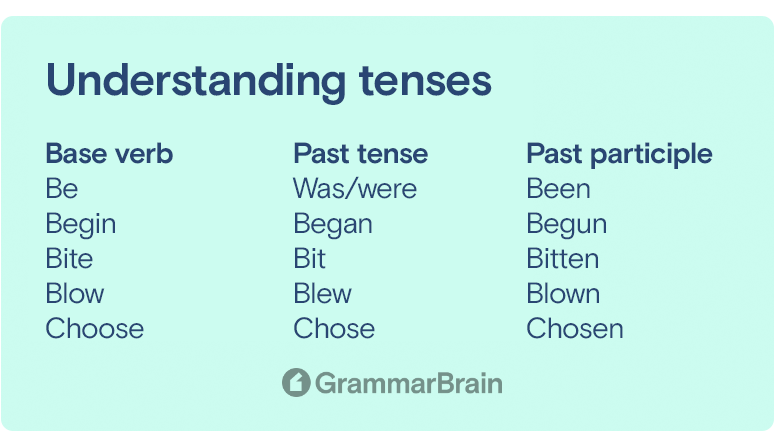
What is the past tense of “tour?” Most commonly, the past tense of the word “tour” is “toured.” Although the word form will change based on its participle. And the sentence where it’s used. For example, referencing “tour” in the present participle form will change it to “touring,” but in the infinitive form, will be “tour.”
What is the past tense of the word "tour"
The past tense (past participle) form of “tour” is “toured.” The infinitive of the word form is “tour.” The present participle form is “touring.” The past tense form is “toured” and past participle form is “toured.”
Understanding verb tenses
The general grammar rules that govern past tenses are as follows. The simple past tense form is created by adding a -ed or -d affix to the root word of the verb. Some verbs use a -t variation where they end in a -t. For example, when "dream" turns into "dreamt."
The past perfect tense is formed for regular verbs (ending in -ed, -d, or -t) by adding "had" followed by the verb. For example, "I had finished ."
The past continuous tense is formed by the verb "be" followed by the affix or ending of -ing. For example, " we were having dinner."
Lastly, the past perfect continuous tense is formed by adding "had been" followed by the affix or ending of -ing. For example, "I had been building a castle with my sister."
For more information on forming all past tenses, visit our " understanding verb tenses " resource.
Sentence examples for the past tense of the word "tour"
- Infinitive: I tour.
- Present participle: She is touring.
- Past tense: I toured.
- Past particle: I have toured.
Verb forms of the word "tour"
Example sentences in all verb forms:
Indefinite present tense
Present continuous tense.
She/he/it is touring.
Present perfect continuous tense
She/he/it has/had toured.
Present perfect tense
She/he/it has/had been touring.
Simple past tense
She/he/it toured.
Past continuous tense
She/he/it were touring.
Past perfect tense
Perfect continuous tense.
She/he/it will/shall tour.
Simple future tense
She/he/it will/shall be touring.
Future perfect tense
She/he/it will/shall have toured.
Future perfect continuous tense
She/he/it will/shall have been touring.
Sentence examples in all forms
Sentence examples in all participles and parts of speech :
Fact checked: Content is rigorously reviewed by a team of qualified and experienced fact checkers. Fact checkers review articles for factual accuracy, relevance, and timeliness. Learn more.

About the author
Dalia Y.: Dalia is an English Major and linguistics expert with an additional degree in Psychology. Dalia has featured articles on Forbes, Inc, Fast Company, Grammarly, and many more. She covers English, ESL, and all things grammar on GrammarBrain.
Core lessons
- Abstract Noun
- Accusative Case
- Active Sentence
- Alliteration
- Adjective Clause
- Adjective Phrase
- Adverbial Clause
- Appositive Phrase
- Body Paragraph
- Compound Adjective
- Complex Sentence
- Compound Words
- Compound Predicate
- Common Noun
- Comparative Adjective
- Comparative and Superlative
- Compound Noun
- Compound Subject
- Compound Sentence
- Copular Verb
- Collective Noun
- Colloquialism
- Conciseness
- Conditional
- Concrete Noun
- Conjunction
- Conjugation
- Conditional Sentence
- Comma Splice
- Correlative Conjunction
- Coordinating Conjunction
- Coordinate Adjective
- Cumulative Adjective
- Dative Case
- Declarative Statement
- Direct Object Pronoun
- Direct Object
- Dangling Modifier
- Demonstrative Pronoun
- Demonstrative Adjective
- Direct Characterization
- Definite Article
- Doublespeak
- Equivocation Fallacy
- Future Perfect Progressive
- Future Simple
- Future Perfect Continuous
- Future Perfect
- First Conditional
- Gerund Phrase
- Genitive Case
- Helping Verb
- Irregular Adjective
- Irregular Verb
- Imperative Sentence
- Indefinite Article
- Intransitive Verb
- Introductory Phrase
- Indefinite Pronoun
- Indirect Characterization
- Interrogative Sentence
- Intensive Pronoun
- Inanimate Object
- Indefinite Tense
- Infinitive Phrase
- Interjection
- Intensifier
- Indicative Mood
- Juxtaposition
- Linking Verb
- Misplaced Modifier
- Nominative Case
- Noun Adjective
- Object Pronoun
- Object Complement
- Order of Adjectives
- Parallelism
- Prepositional Phrase
- Past Simple Tense
- Past Continuous Tense
- Past Perfect Tense
- Past Progressive Tense
- Present Simple Tense
- Present Perfect Tense
- Personal Pronoun
- Personification
- Persuasive Writing
- Parallel Structure
- Phrasal Verb
- Predicate Adjective
- Predicate Nominative
- Phonetic Language
- Plural Noun
- Punctuation
- Punctuation Marks
- Preposition
- Preposition of Place
- Parts of Speech
- Possessive Adjective
- Possessive Determiner
- Possessive Case
- Possessive Noun
- Proper Adjective
- Proper Noun
- Present Participle
- Quotation Marks
- Relative Pronoun
- Reflexive Pronoun
- Reciprocal Pronoun
- Subordinating Conjunction
- Simple Future Tense
- Stative Verb
- Subjunctive
- Subject Complement
- Subject of a Sentence
- Sentence Variety
- Second Conditional
- Superlative Adjective
- Slash Symbol
- Topic Sentence
- Types of Nouns
- Types of Sentences
- Uncountable Noun
- Vowels and Consonants
Popular lessons

Stay awhile. Your weekly dose of grammar and English fun.

The world's best online resource for learning English. Understand words, phrases, slang terms, and all other variations of the English language.
- Abbreviations
- Editorial Policy

'tour' conjugation table in English
Past participle, present participle, present continuous, present perfect, present perfect continuous, past continuous, past perfect, past perfect continuous, future continuous, future perfect, future perfect continuous.
Quick word challenge
Quiz Review
Score: 0 / 5

All ENGLISH words that begin with 'T'
Online Language Dictionaries
Perfect tenses, continuous (progressive) and emphatic tenses, compound continuous (progressive) tenses, conditional, subjunctive.
*Blue letters in conjugations are irregular forms. ( example ) *Red letters in conjugations are exceptions to the model. ( example )
Report a problem.
Verb "tour"
For the settings to take effect, you must restart the trainer Restart
Conjugation
Simple tense.
Present Simple
- he, she tours
Past Simple
- he, she toured
- they toured
Future Simple
- I will tour
- you will tour
- he, she will tour
- we will tour
- they will tour
Continuous Tense
Present Simple Continuous
- I am touring
- you are touring
- he, she is touring
- we are touring
- they are touring
Past Simple Continuous
- I was touring
- you were touring
- he, she was touring
- we were touring
- they were touring
Future Simple Continuous
- I will be touring
- you will be touring
- he, she will be touring
- we will be touring
- they will be touring
Perfect Tense
Present Perfect
- I have toured
- you have toured
- he, she has toured
- we have toured
- they have toured
Past Perfect
- I had toured
- you had toured
- he, she had toured
- we had toured
- they had toured
Future Perfect
- I will have toured
- you will have toured
- he, she will have toured
- we will have toured
- they will have toured
Perfect Continuous Tense
Present Perfect Continuous
- I have been touring
- you have been touring
- he, she has been touring
- we have been touring
- they have been touring
Past Perfect Continuous
- I had been touring
- you had been touring
- he, she had been touring
- we had been touring
- they had been touring
Future Perfect Continuous
- I will have been touring
- you will have been touring
- he, she will have been touring
- we will have been touring
- they will have been touring
Conditional
- I would tour
- you would tour
- he, she would tour
- we would tour
- they would tour
- I would have toured
- you would have toured
- he, she would have toured
- we would have toured
- they would have toured
Present Continuous
- I would be touring
- you would be touring
- he, she would be touring
- we would be touring
- they would be touring
Perfect Continuous
- I would have been touring
- you would have been touring
- he, she would have been touring
- we would have been touring
- they would have been touring
- we Let's tour
Other verbs
Be the first to comment.
Add comment
Conjugation English verb to tour
Simple present, present progressive/continuous, simple past, past progressive/continuous, present perfect simple, present perfect progressive/continuous, past perfect, past perfect progressive/continuous, future progressive/continuous, future perfect, future perfect continuous, conditional, progressive, perfect progressive, translation to tour.
- Slovenščina
- FAQ Technical Questions
- Text Translation
- Vocabulary Trainer
- Online Dictionary
- Login
- Online dictionary
- Products & Shop
- Conjugation
- Vocabulary trainer
- Dictionary API
- Add to home screen
- Browse the dictionaries
- Terms and conditions of use
- Supply chain
- Data Protection Declaration
- Legal notice
- Privacy Settings
- EN');"> English
- FR');"> French
- DE');"> German
- LA');"> Latin
- ES');"> Spanish
Verb Table for tour
- Simple tenses
- Continuous tenses
Conditional
Simple tenses • continuous tenses • conditional • imperative • impersonal, present perfect, past perfect, will -future, going to -future, future perfect, conditional past, past participle, browse the conjugations (verb tables).
- tour around
- tout around
Look up "tour" in other languages
Links to further information.
You can suggest improvements to this PONS entry here:
We are using the following form field to detect spammers. Please do leave them untouched. Otherwise your message will be regarded as spam. We are sorry for the inconvenience.
My search history
- Most popular
- English ⇄ German
- English ⇄ Slovenian
- German ⇄ Spanish
- German ⇄ French
- German ⇄ Greek
- German ⇄ Polish
- Arabic ⇄ English
- Arabic ⇄ German
- Bulgarian ⇄ English
- Bulgarian ⇄ German
- Chinese ⇄ English
- Chinese ⇄ French
- Chinese ⇄ German
- Chinese ⇄ Spanish
- Croatian ⇄ German
- Czech ⇄ German
- Danish ⇄ German
- Dutch ⇄ German
- Elvish ⇄ German
- English ⇄ Arabic
- English ⇄ Bulgarian
- English ⇄ Chinese
- English ⇄ French
- English ⇄ Italian
- English ⇄ Polish
- English ⇄ Portuguese
- English ⇄ Russian
- English → Serbian
- English ⇄ Spanish
- Finnish ⇄ German
- French ⇄ Chinese
- French ⇄ English
- French ⇄ German
- French ⇄ Italian
- French ⇄ Polish
- French ⇄ Slovenian
- French ⇄ Spanish
- German ⇄ Arabic
- German ⇄ Bulgarian
- German ⇄ Chinese
- German ⇄ Croatian
- German ⇄ Czech
- German ⇄ Danish
- German ⇄ Dutch
- German ⇄ Elvish
- German ⇄ English
- German ⇄ Finnish
- German ⇄ Hungarian
- German → Icelandic
- German ⇄ Italian
- German ⇄ Japanese
- German ⇄ Latin
- German ⇄ Norwegian
- German ⇄ Persian
- German ⇄ Portuguese
- German ⇄ Romanian
- German ⇄ Russian
- German → Serbian
- German ⇄ Slovakian
- German ⇄ Slovenian
- German ⇄ Swedish
- German ⇄ Turkish
- Dictionary of German Spelling
- Greek ⇄ German
- Hungarian ⇄ German
- Italian ⇄ English
- Italian ⇄ French
- Italian ⇄ German
- Italian ⇄ Polish
- Italian ⇄ Slovenian
- Italian ⇄ Spanish
- Japanese ⇄ German
- Latin ⇄ German
- Norwegian ⇄ German
- Persian ⇄ German
- Polish ⇄ English
- Polish ⇄ French
- Polish ⇄ German
- Polish ⇄ Italian
- Polish ⇄ Russian
- Polish ⇄ Spanish
- Portuguese ⇄ English
- Portuguese ⇄ German
- Portuguese ⇄ Spanish
- Romanian ⇄ German
- Russian ⇄ English
- Russian ⇄ German
- Russian ⇄ Polish
- Slovakian ⇄ German
- Slovenian ⇄ English
- Slovenian ⇄ French
- Slovenian ⇄ German
- Slovenian ⇄ Italian
- Slovenian ⇄ Spanish
- Spanish ⇄ Chinese
- Spanish ⇄ English
- Spanish ⇄ French
- Spanish ⇄ German
- Spanish ⇄ Italian
- Spanish ⇄ Polish
- Spanish ⇄ Portuguese
- Spanish ⇄ Slovenian
- Swedish ⇄ German
- Turkish ⇄ German
Identified ad region: ALL Identified country code: RU -->

Tour (to ) conjugation
Conjugation of tour, examples of tour, more english verbs, similar but longer, other english verbs with the meaning similar to '':, '' in different languages.
Onlymyenglish.com
Learn English
Tour Verb Forms – Past Tense, Past Participle & V1V2V3

Table of Contents
Tour past tense
Tour past participle, tour verb forms v1 v2 v3 v4, conjugation of tour.
More verb past tense
You might also like

Display Verb Forms – Past Tense, Past Participle & V1V2V3

Implicate Verb Forms – Past Tense, Past Participle & V1V2V3

Jog Verb Forms – Past Tense, Past Participle & V1V2V3

Hurry Verb Forms – Past Tense, Past Participle & V1V2V3

Repeat Verb Forms – Past Tense, Past Participle & V1V2V3

Grab Verb Forms – Past Tense, Past Participle & V1V2V3
Conjugation of verb (past tense) tour
Past simple, past participle.
- ⭐Conjugation
- Podmínkové věty
- Frázová slovesa
- ⭐Conditional
- ⭐Subjunktiv
- ⭐Participle
Conjugation of the regular verb [tour]
Conjugation is the creation of derived forms of a verb from its principal parts by inflection (alteration of form according to rules of grammar). For instance, the verb "break" can be conjugated to form the words break, breaks, broke, broken and breaking.
The term conjugation is applied only to the inflection of verbs, and not of other parts of speech (inflection of nouns and adjectives is known as declension). Also it is often restricted to denoting the formation of finite forms of a verb – these may be referred to as conjugated forms, as opposed to non-finite forms, such as the infinitive or gerund, which tend not to be marked for most of the grammatical categories.
Conjugation is also the traditional name for a group of verbs that share a similar conjugation pattern in a particular language (a verb class). A verb that does not follow all of the standard conjugation patterns of the language is said to be an irregular verb .
Present Continuous
Past continuous, present perfect, present perfect continuous, past perfect, past perfect continuous, future continuous, future perfect, future perfect continuous, conditional of the regular verb [tour].
Causality (also referred to as causation or cause and effect ) is influence by which one event, process, state or object (a cause) contributes to the production of another event, process, state or object (an effect) where the cause is partly responsible for the effect, and the effect is partly dependent on the cause. In general, a process has many causes, which are also said to be causal factors for it, and all lie in its past. An effect can in turn be a cause of, or causal factor for, many other effects, which all lie in its future.
The conditional mood (abbreviated cond) is a grammatical mood used in conditional sentences to express a proposition whose validity is dependent on some condition, possibly counterfactual.
English does not have an inflective (morphological) conditional mood, except in as much as the modal verbs could, might, should and would may in some contexts be regarded as conditional forms of can, may, shall and will respectively. What is called the English conditional mood (or just the conditional) is formed periphrastically using the modal verb would in combination with the bare infinitive of the following verb. (Occasionally should is used in place of would with a first person subject – see shall and will. Also the aforementioned modal verbs could, might and should may replace would in order to express appropriate modality in addition to conditionality.)
Conditional present -->
Conditional present progressive -->, conditional perfect -->, conditional perfect progressive -->, subjunktiv of the regular verb [tour].
The subjunctive is a grammatical mood, a feature of the utterance that indicates the speaker's attitude toward it. Subjunctive forms of verbs are typically used to express various states of unreality such as: wish, emotion, possibility, judgement, opinion, obligation, or action that has not yet occurred; the precise situations in which they are used vary from language to language. The subjunctive is one of the irrealis moods, which refer to what is not necessarily real. It is often contrasted with the indicative, a realis mood which is used principally to indicate that something is a statement of fact.
Subjunctives occur most often, although not exclusively, in subordinate clauses, particularly that-clauses. Examples of the subjunctive in English are found in the sentences "I suggest that you be careful" and "It is important that she stay by your side."
The subjunctive mood in English is a clause type used in some contexts which describe non-actual possibilities, e.g. "It's crucial that you be here" and "It's crucial that he arrive early." In English, the subjunctive is syntactic rather than inflectional, since there is no specifically subjunctive verb form. Rather, subjunctive clauses recruit the bare form of the verb which is also used in a variety of other constructions.
Present subjunctive -->
Past subjunctive -->, past perfect subjunctive -->, imperativ of the regular verb [tour].
The imperative mood is a grammatical mood that forms a command or request.
An example of a verb used in the imperative mood is the English phrase "Go." Such imperatives imply a second-person subject (you), but some other languages also have first- and third-person imperatives, with the meaning of "let's (do something)" or "let them (do something)" (the forms may alternatively be called cohortative and jussive).
Imperativ -->
Participle of the regular verb [tour].
The past participle is one of the most important parts of English grammar. It’s used to express perfect tenses and to form the passive voice. It’s also a useful tool for writing sentences that describe actions that started in the past and are still happening today. The past participles of irregular verbs don’t follow a specific pattern and can have numerous endings.
Present participle -->
Past participle -->, recent articles.
- Differences: past simple and past continuous
- Past simple sentences
- Past continuous structure
- Adverbs of past continuous tense
- Past continuous verbs
Start with any verb and browse through irregular verbs in alphabetical order
Use the button "Random choice"
Looking for a specific irregular verb?
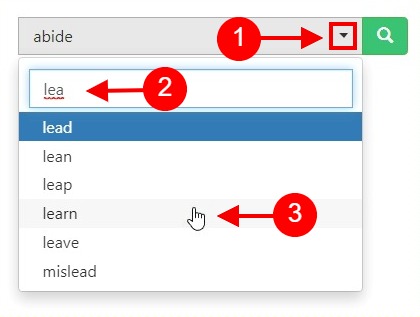

regular verbs & Irregular verbs
English Study Here
Past Tense of Tour, Past Participle of Tour, V1 V2 V3 V4 V5 Form of Tour

Tour means; visit, travel, wander, tour, walk, wander in
Synonym Words With Tour
- peregrinate
Example Sentences with Tour
- How much is the tour per person?
- They toured France during their honeymoon.
Here are more verbs and v1 v2 v3 forms;
Related Posts
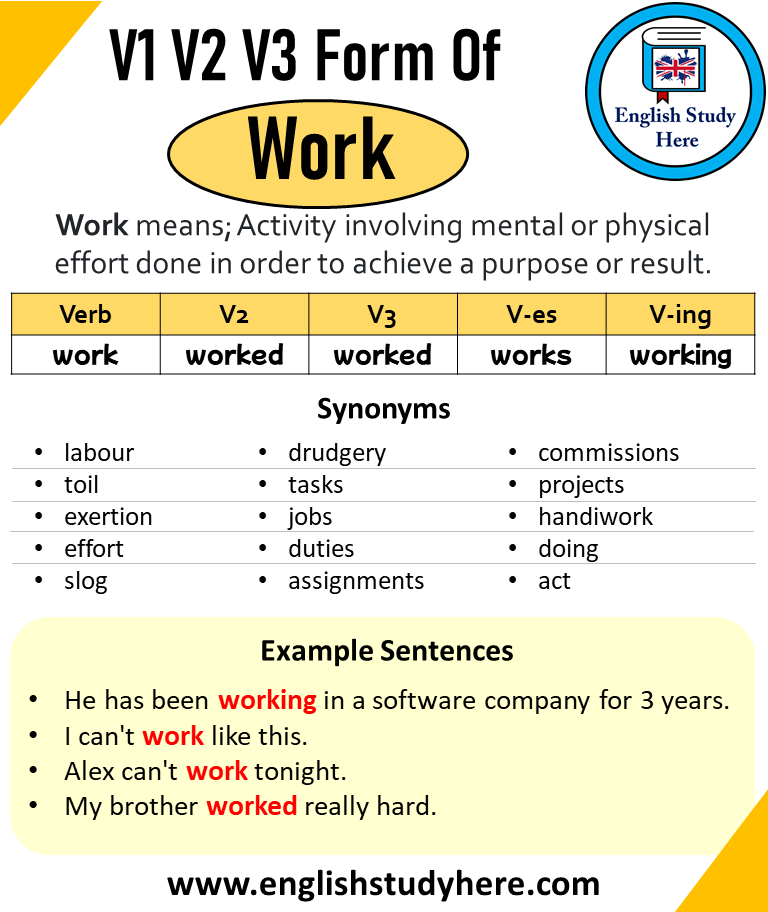
Past Tense of Work, Past Participle of Work, V1 V2 V3 V4 V5 Form of Work

Past Tense of Congratulate, Past Participle of Congratulate, V1 V2 V3 V4 V5 Form of Congratulate

Past Tense of Justify, Past Participle of Justify, V1 V2 V3 V4 V5 Form of Justify
About the author.
- 1.1 Pronunciation
- 1.2.1.1 Hyponyms
- 1.2.1.2 Derived terms
- 1.2.1.3 Related terms
- 1.2.1.4 Translations
- 1.2.2.1 Translations
- 1.4.2 References
- 1.5 Anagrams
- 3.1 Etymology
- 3.2 Pronunciation
- 3.3.1 Synonyms
- 4.1 Pronunciation
- 4.2.1.1 Derived terms
- 4.2.1.2 Descendants
- 4.3.1.1 Derived terms
- 4.3.1.2 Descendants
- 4.4.1.1 Derived terms
- 4.5 See also
- 4.6 Further reading
- 4.7 Anagrams
- 5.1 Alternative forms
- 5.2 Etymology
- 5.3 Pronunciation
- 5.4.1 Descendants
- 5.4.2 References
- 6.1 Pronunciation
- 7.1 Pronunciation
- 7.3.1 Alternative forms
- 8.1 Etymology
- 8.2 Pronunciation
- 8.3.1 Derived terms
- 8.4 Further reading
- 9.1.1 Declension
- 9.2 References
English [ edit ]
Pronunciation [ edit ].
- IPA ( key ) : /tɔː(ɹ)/ , /tʊə(ɹ)/ , /tɝ/ , /tuːɹ/
- Rhymes: -ɔː(ɹ) , -ʊə(ɹ)
- Homophone : tore ( pour-poor merger )
Etymology 1 [ edit ]
From Old French tour , tourn , from the verb torner , tourner .
Noun [ edit ]
tour ( plural tours )
- A journey through a particular building, estate, country, etc. On our last holiday to Spain we took a tour of the wine-growing regions.
- A guided visit to a particular place, or virtual place. On the company's website, you can take a virtual tour of the headquarters.
- A journey through a given list of places, such as by an entertainer performing concerts . Metallica's tour of Europe
- ( sports , chiefly cricket and rugby ) A trip taken to another country in which several matches are played.
- ( sports , cycling ) A street and road race , frequently multiday.
- ( sports ) A set of competitions which make up a championship .
- 2022 September 21, Carly Olson, Dan Bilefsky, “Ten prisoners, including Americans, have been released as part of a Russia-Ukraine exchange, Saudi Arabia says.”, in The New York Times [1] , →ISSN : Among those released were two Americans who had been held captive for more than three months: Alex Drueke, a former U.S. Army staff sergeant who served two tours in Iraq, according to his aunt, Dianna Shaw; [ … ]
- ( graph theory ) A closed trail .
- 1667 , John Milton , “Book X”, in Paradise Lost. [ … ] , London: [ … ] [ Samuel Simmons ], [ … ] , →OCLC ; republished as Paradise Lost in Ten Books: [ … ] , London: Basil Montagu Pickering [ … ] , 1873 , →OCLC : The Bird of Jove, stoopt from his aerie tour ,
- 1712 , Richard Blackmore , Creation : It [blood] onward springs, and makes the wondrous tour
- ( snooker ) A circuit of snooker tournaments
Hyponyms [ edit ]
- guided tour
- tour de force
- tour d'horizon
- whirlwind tour
Derived terms [ edit ]
- abortion tour
- Cook's tour
- fifty-cent tour
- knight's tour
- mystery tour
- nickel tour
- package tour
- railtour , rail tour
- starlight tour
- ten-cent tour
- tour operator
- what happens on tour stays on tour
- whistlestop tour
Related terms [ edit ]
Translations [ edit ], verb [ edit ].
tour ( third-person singular simple present tours , present participle touring , simple past and past participle toured )
- ( intransitive ) To make a journey The Rolling Stones were still touring when they were in their seventies.
- ( transitive ) To make a circuit of a place The circuses have been touring Europe for the last few weeks.
Etymology 2 [ edit ]
Old French tor , French tour ( “ tower ” )
- ( dated ) A tower .
Etymology 3 [ edit ]
- ( obsolete ) To toot a horn .
References [ edit ]
- “ tour ”, in Webster’s Revised Unabridged Dictionary , Springfield, Mass.: G. & C. Merriam , 1913, →OCLC .
Anagrams [ edit ]
- rout , trou
Breton [ edit ]
- Hard mutation of dour .
Dutch [ edit ]
Etymology [ edit ].
Borrowed from French tour .
tour m ( plural tours , diminutive tourtje n )
Synonyms [ edit ]
French [ edit ].
- IPA ( key ) : /tuʁ/
- Rhymes: -uʁ
Inherited from Old French tor , from Latin turrem , from Ancient Greek τύρρις ( túrrhis ) , τύρσις ( túrsis ) .
tour f ( plural tours )
- tower La tour de Pise est penchée. ― The Tower of Pisa is leaning.
- ( chess ) rook
- apartment building
- tour de Babel
- tour de contrôle
- tour de forage
- tour de guet
- tour de siège
- tour d’ivoire
- tour Eiffel
See also [ edit ]
Further reading [ edit ].
- “ tour ”, in Trésor de la langue française informatisé [ Digitized Treasury of the French Language ] , 2012.
- “ tour ” in Dictionnaire français en ligne Larousse .
Middle English [ edit ]
Alternative forms [ edit ].
- thour , tor , tore , toure , towere , towour , tur
From Old English tūr , tor , torr , from Latin turris .
- IPA ( key ) : /tuːr/
tour ( plural toures )
- English: tower ( see there for further descendants )
- Scots: tour , towr
- Yola: toweare
- “ tǒur, n. (1) ”, in MED Online , Ann Arbor, Mich.: University of Michigan , 2007.
Portuguese [ edit ]
- ( Brazil ) IPA ( key ) : /ˈtuʁ/ [ˈtuh]
- ( São Paulo ) IPA ( key ) : /ˈtuɾ/
- ( Rio de Janeiro ) IPA ( key ) : /ˈtuʁ/ [ˈtuχ]
- ( Southern Brazil ) IPA ( key ) : /ˈtuɻ/
- ( Portugal ) IPA ( key ) : /ˈtuɾ/
- ( Southern Portugal ) IPA ( key ) : /ˈtu.ɾi/
- tour ( guided visit )
- tour ( journey through a given list of places )
Scots [ edit ]
- IPA ( key ) : /tur/
Spanish [ edit ]
- IPA ( key ) : /ˈtuɾ/ [ˈt̪uɾ]
- Rhymes: -uɾ
- tour , guided visit to a country, museum, etc. Synonyms: viaje , visita , excursión
- ( sports ) tour , a trip to another country to play matches
- ( music ) tour , a trip to other countries undertaken by a singer or musician Synonym: gira
- Tour de Francia
- “ tour ”, in Diccionario de la lengua española , Vigésima tercera edición , Real Academia Española, 2014
Swedish [ edit ]
tour c
- ( sports ) a tour (chiefly in individual ball games)
Declension [ edit ]
- tour in Svensk ordbok ( SO )
- tour in Svenska Akademiens ordlista ( SAOL )
- tour in Svenska Akademiens ordbok ( SAOB )
- English 1-syllable words
- English terms with IPA pronunciation
- English terms with audio links
- Rhymes:English/ɔː(ɹ)
- Rhymes:English/ʊə(ɹ)
- Rhymes:English/ʊə(ɹ)/1 syllable
- English terms with homophones
- English terms derived from Old French
- English lemmas
- English nouns
- English countable nouns
- English terms with usage examples
- en:Military
- English terms with quotations
- en:Graph theory
- English terms with obsolete senses
- English verbs
- English intransitive verbs
- English transitive verbs
- English terms derived from French
- English dated terms
- English obsolete terms
- Breton non-lemma forms
- Breton mutated nouns
- Breton hard-mutation forms
- Dutch terms borrowed from French
- Dutch terms derived from French
- Dutch terms with audio links
- Dutch lemmas
- Dutch nouns
- Dutch nouns with plural in -s
- Dutch masculine nouns
- French 1-syllable words
- French terms with IPA pronunciation
- French terms with audio links
- Rhymes:French/uʁ
- Rhymes:French/uʁ/1 syllable
- French terms inherited from Old French
- French terms derived from Old French
- French terms inherited from Latin
- French terms derived from Latin
- French terms derived from Ancient Greek
- French lemmas
- French nouns
- French countable nouns
- French feminine nouns
- French terms with usage examples
- French masculine nouns
- French nouns that have different meanings depending on their gender
- fr:Buildings
- Middle English terms inherited from Old English
- Middle English terms derived from Old English
- Middle English terms derived from Latin
- Middle English terms with IPA pronunciation
- Middle English lemmas
- Middle English nouns
- Portuguese 1-syllable words
- Portuguese terms with IPA pronunciation
- Portuguese 2-syllable words
- Portuguese lemmas
- Portuguese nouns
- Portuguese countable nouns
- Portuguese masculine nouns
- Scots terms with IPA pronunciation
- Scots lemmas
- Scots nouns
- Spanish terms borrowed from French
- Spanish terms derived from French
- Spanish 1-syllable words
- Spanish terms with IPA pronunciation
- Rhymes:Spanish/uɾ
- Rhymes:Spanish/uɾ/1 syllable
- Spanish lemmas
- Spanish nouns
- Spanish countable nouns
- Spanish masculine nouns
- Swedish lemmas
- Swedish nouns
- Swedish common-gender nouns
- Quotation templates to be cleaned
- Egyptian Arabic terms with redundant script codes
- Mandarin terms with redundant transliterations
- Hebrew terms with redundant script codes
- Russian terms with non-redundant manual transliterations
- Vietnamese terms with redundant script codes
- Requests for review of Dutch translations
- Requests for example sentences in French
Navigation menu
Example: eat, ate, eaten
Past Perfect
Future perfect, present - conditional, perfect - conditional.
- More from M-W
- To save this word, you'll need to log in. Log In
Definition of tour
(Entry 1 of 2)
Definition of tour (Entry 2 of 2)
transitive verb
intransitive verb
- peregrinate
Examples of tour in a Sentence
These examples are programmatically compiled from various online sources to illustrate current usage of the word 'tour.' Any opinions expressed in the examples do not represent those of Merriam-Webster or its editors. Send us feedback about these examples.
Word History
Middle English, from Anglo-French tur, tourn turning, circuit, journey — more at turn
14th century, in the meaning defined at sense 2b
1708, in the meaning defined at intransitive sense
Phrases Containing tour
- tour de force
- package tour
- tour of inspection
- Cook's tour
Dictionary Entries Near tour
Cite this entry.
“Tour.” Merriam-Webster.com Dictionary , Merriam-Webster, https://www.merriam-webster.com/dictionary/tour. Accessed 7 Apr. 2024.
Kids Definition
Kids definition of tour.
Kids Definition of tour (Entry 2 of 2)
More from Merriam-Webster on tour
Nglish: Translation of tour for Spanish Speakers
Britannica English: Translation of tour for Arabic Speakers
Britannica.com: Encyclopedia article about tour
Subscribe to America's largest dictionary and get thousands more definitions and advanced search—ad free!

Can you solve 4 words at once?
Word of the day.
See Definitions and Examples »
Get Word of the Day daily email!
Popular in Grammar & Usage
The tangled history of 'it's' and 'its', more commonly misspelled words, why does english have so many silent letters, your vs. you're: how to use them correctly, every letter is silent, sometimes: a-z list of examples, popular in wordplay, the words of the week - apr. 5, 12 bird names that sound like compliments, 10 scrabble words without any vowels, 12 more bird names that sound like insults (and sometimes are), 8 uncommon words related to love, games & quizzes.

- Cambridge Dictionary +Plus
Meaning of tour in English
Your browser doesn't support HTML5 audio
- break-journey
- circumnavigation
You can also find related words, phrases, and synonyms in the topics:
- She spent three months touring her empire .
- The prime minister toured the flooded regions .
- I spent a month touring round Europe .
- around Robin Hood's barn idiom
- communication
- public transport
- super-commuting
- transoceanic
- well travelled
Related word
Tour | american dictionary, tour | business english, examples of tour, collocations with tour.
These are words often used in combination with tour .
Click on a collocation to see more examples of it.
Translations of tour
Get a quick, free translation!

Word of the Day
bits and bobs
small things or jobs of different types

Shoots, blooms and blossom: talking about plants

Learn more with +Plus
- Recent and Recommended {{#preferredDictionaries}} {{name}} {{/preferredDictionaries}}
- Definitions Clear explanations of natural written and spoken English English Learner’s Dictionary Essential British English Essential American English
- Grammar and thesaurus Usage explanations of natural written and spoken English Grammar Thesaurus
- Pronunciation British and American pronunciations with audio English Pronunciation
- English–Chinese (Simplified) Chinese (Simplified)–English
- English–Chinese (Traditional) Chinese (Traditional)–English
- English–Dutch Dutch–English
- English–French French–English
- English–German German–English
- English–Indonesian Indonesian–English
- English–Italian Italian–English
- English–Japanese Japanese–English
- English–Norwegian Norwegian–English
- English–Polish Polish–English
- English–Portuguese Portuguese–English
- English–Spanish Spanish–English
- English–Swedish Swedish–English
- Dictionary +Plus Word Lists
- English Noun Verb
- American Noun Verb
- Business Noun Verb
- Collocations
- Translations
- All translations
Add tour to one of your lists below, or create a new one.
{{message}}
Something went wrong.
There was a problem sending your report.
Conjugación verbo tour - inglés
Modelo : obey
Auxiliar : have , be
Otras formas: tour oneself / not tour
Contracciones
- he/she/it tours
- he/she/it toured
- they toured
Present continuous
- I am touring
- you are touring
- he/she/it is touring
- we are touring
- they are touring
Present perfect
- I have toured
- you have toured
- he/she/it has toured
- we have toured
- they have toured
- I will tour
- you will tour
- he/she/it will tour
- we will tour
- they will tour
Future perfect
- I will have toured
- you will have toured
- he/she/it will have toured
- we will have toured
- they will have toured
Past continous
- I was touring
- you were touring
- he/she/it was touring
- we were touring
- they were touring
Past perfect
- I had toured
- you had toured
- he/she/it had toured
- we had toured
- they had toured
Future continuous
- I will be touring
- you will be touring
- he/she/it will be touring
- we will be touring
- they will be touring
Present perfect continuous
- I have been touring
- you have been touring
- he/she/it has been touring
- we have been touring
- they have been touring
Past perfect continuous
- I had been touring
- you had been touring
- he/she/it had been touring
- we had been touring
- they had been touring
Future perfect continuous
- I will have been touring
- you will have been touring
- he/she/it will have been touring
- we will have been touring
- they will have been touring
Perfect participle
- having toured
Ayudando a millones de personas y grandes organizaciones a comunicar con más eficacia y precisión en todos los idiomas.
Collins reaches Charleston final with 12th successive tour win

The Reuters Daily Briefing newsletter provides all the news you need to start your day. Sign up here.
Reporting by Janina Nuno Rios in Mexico City; Additional reporting by Aadi Nair in Bengaluru; Editing by Hugh Lawson and Christopher Cushing
Our Standards: The Thomson Reuters Trust Principles. , opens new tab

Spaniard Pedro Martinez knocked off No. 1 seed Casper Ruud of Norway on Saturday to reach the final at the Millennium Estoril Open in Portugal.

The Pittsburgh Penguins aim to extend their four-game winning streak and enhance their playoff chances when they visit the Toronto Maple Leafs on Monday night.
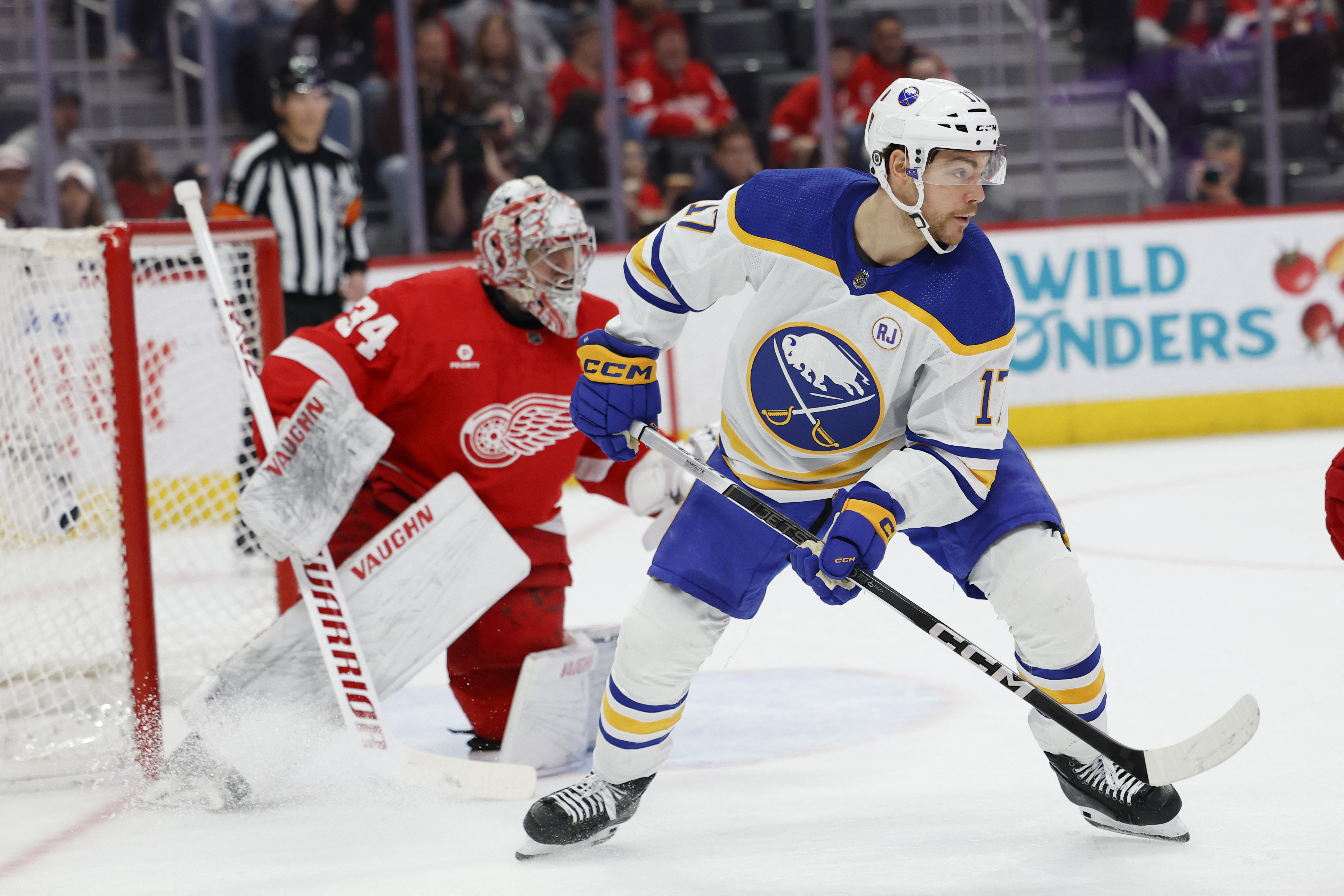
Fenerbahce's players walked off the pitch after one minute of Sunday's Turkish Super Cup match against Galatasaray, forcing the game to be abandoned and conceding the trophy.
- Dictionaries home
- American English
- Collocations
- German-English
- Grammar home
- Practical English Usage
- Learn & Practise Grammar (Beta)
- Word Lists home
- My Word Lists
- Recent additions
- Resources home
- Text Checker
Definition of tour verb from the Oxford Advanced Learner's Dictionary
- tour something He toured America with his one-man show.
- She toured the country promoting her book.
- (+ adv./prep.) We spent four weeks touring around Europe.
- He's toured across Europe, the UK and North America.
- She is currently touring with her new band.
- He no longer tours.
- The band toured the UK last year.
- The town makes an ideal base for touring the Highlands.
- I was on my own as I toured round.
- We plan to tour all over the country.
- She has toured extensively in the US.
- The Beatles stopped touring years before.
- extensively
- internationally
Want to learn more?
Find out which words work together and produce more natural-sounding English with the Oxford Collocations Dictionary app. Try it for free as part of the Oxford Advanced Learner’s Dictionary app.

South Carolina meets Iowa in the women's NCAA championship game today. Here's how to watch live.
After two weeks of March Madness , there are only two teams left. The Iowa Hawkeyes will face off against the South Carolina Gamecocks in the NCAA women’s championship game today. Not only will this be Caitlin Clark’s final college basketball game, but the highly anticipated rematch of last year’s national semifinals in Dallas could also break television viewership records.
Watch Today's Game on Sling TV
The Hawkeyes and Gamecocks are both No. 1 seeds. South Carolina advanced to the NCAA tournament championship game after a 78-59 win over No. 3 NC State on Friday. Iowa defeated UConn 71-69 in a nail-biter with the Final Four round coming down to the final seconds.
Get ready for the grand finale of March Madness 2024. Here’s everything to know about how to watch Iowa vs. South Carolina today, including the women's NCAA championship game start time and best livestream options.
How to Watch the Iowa vs. South Carolina Game Without Cable
Today's Iowa vs. South Carolina game will air on ABC. If you don't have cable, most cost-effective way to stream the NCAA Women's Tournament championship game is through a subscription to Sling TV .
Right now, there is a Sling TV deal offering 50% off your first month — bringing the Blue package with ABC down to just $22.50 and the comprehensive Orange + Blue package down to $30. Sling TV comes with 50 hours of free cloud-based DVR recording space, perfect for recording the final women's March Madness game if you're not home to watch it live.
Watch Iowa vs. South Carolina on Sling TV

With Sling TV you can stream the women's NCAA championship game on ABC. Right now, Sling Blue is 50% off for your first month, bringing the cost of a subscription down to $22.50.
$45 $22.50
For Your First Month
How to Watch the Iowa vs. South Carolina Game for Free
With Fubo's sports-focused live TV streaming service, you'll get access to ABC and 190 other channels. A FuboTV subscription costs $79.99 per month, but the streamer is offering a seven-day free trial right now. Grab the free trial offer to stream the March Madness championship matchup at no cost.
Watch Iowa vs. South Carolina on FuboTV

Fubo offers NCAA Basketball coverage on a variety of channels — including ABC — to watch March Madness games live without cable. Start your seven-day free trial to catch the Iowa vs. South Carolina game live.
$79.99/Month
7-Day Free Trial
What time is the Iowa vs. South Carolina game?
The women’s NCAA tournament concludes with Iowa vs. South Carolina game on Sunday, April 7 at 3:00 p.m. ET (12:00 p.m. PT) at the Rocket Mortgage Fieldhouse in Cleveland.
What channel is the Women's NCAA Championship Game on?
The Hawkeyes vs. Gamecocks national championship matchup will be televised by ABC.
2024 NCAA March Madness Schedule
Men's NCAA Tournament
- Selection Sunday: March 17
- First Four: March 19-20
- First round: March 21-22
- Second round: March 23-24
- Sweet 16: March 28-29
- Elite Eight: March 30-31
- Final Four: Saturday, April 6 at State Farm Stadium in Glendale, Arizona
- NCAA championship game: Monday, April 8 at State Farm Stadium in Glendale, Arizona
Women's NCAA Tournament
- First Four: March 20-21
- First round: March 22-23
- Second round: March 24-25
- Sweet 16: March 29-30
- Elite Eight: March 31- April 1
- Final Four: Friday, April 5 at Rocket Mortgage FieldHouse in Cleveland, Ohio
- NCAA championship game: Sunday, April 7 at Rocket Mortgage FieldHouse in Cleveland, Ohio
Updates on Celebrity News, TV, Fashion and More!
RELATED CONTENT:

When Does Caitlin Clark Play Next? How to Watch the Championship Game

Save Over 40% on Max Annual Subscriptions — This Week Only
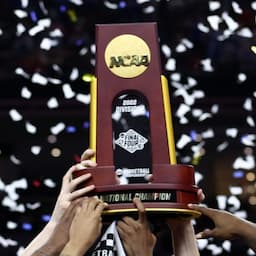
Sales & Deals
Save $40 on Four Months of Sling TV With This March Madness Deal

The Best New TV Shows and Movies to Stream This Week

The Best Live TV Streaming Services in 2024: Compare the Top Plans
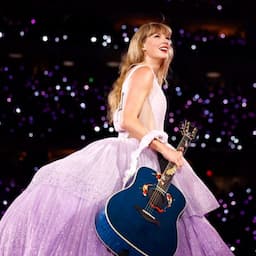
How to Watch 'Taylor Swift: The Eras Tour (Taylor's Version)' Online
- March Madness
Latest News

IMAGES
VIDEO
COMMENTS
This is a reference page for tour verb forms in present, past and participle tenses. Find conjugation of tour. Check past tense of tour here. website for synonyms, antonyms, verb conjugations and translations ... PastTenses is a database of English verbs. One can check verbs forms in different tenses. Use our search box to check present tense ...
Conjugate the English verb tour: indicative, past tense, participle, present perfect, gerund, conjugation models and irregular verbs. Translate tour in context, with examples of use and definition.
Learn the three forms of the English verb 'tour'. the first form (V1) is 'tour' used in present simple and future simple tenses. the second form (V2) is 'Toured' used in past simple tense. the third form (V3) is 'Toured' used in present perfect and past perfect tenses.
For more information on forming all past tenses, visit our "understanding verb tenses" resource. Sentence examples for the past tense of the word "tour" Infinitive: I tour. Present participle: She is touring. Past tense: I toured. Past particle: I have toured. Verb forms of the word "tour" Example sentences in all verb forms: Indefinite present ...
Future Perfect Continuous. I will have been touring you will have been touring he/she/it will have been touring we will have been touring you will have been touring they will have been touring. New from Collins.
English Verb Conjugation ... did tour: Compound continuous (progressive) tenses. present perfect; I: have been touring: you: have been touring: he, she, it: ... *Blue letters in conjugations are irregular forms. *Red letters in conjugations are exceptions to the model. Report a problem. ...
Conjugation of the verb Tour in all tenses: future, present and past. 🎮 Conjugation trainer for memorizing forms. ... Verb forms. Base Form Past Simple Past Participle Gerund ; tour: toured: toured: touring [tʊr] [ˈtʊrd] [ˈtʊrd] [ˈtʊrɪŋ] [tʊə] [tʊəd] [tʊəd] [ˈtʊərɪŋ] Trainer
Conjugation English verb to tour in several modes, tenses, voices, numbers, persons : indicative mode, subjunctive, imperative mood, conditional, participle form ...
Conjugate the verb tour in all tenses: present, past, participle, present perfect, gerund, etc.
This verb can also mean the following: make a journey, do, make. Conjugation of eiti. I. you. it/she/he. we. you all. they. Present Simple. tour. tour. tours. tour. tour. tour. Future Simple. will tour. ... He was just on tour in Portland, and we just started talking, and then we started laughing... I'll give you the tour. I'm taking you on ...
Definition of tour verb in Oxford Advanced Learner's Dictionary. Meaning, pronunciation, picture, example sentences, grammar, usage notes, synonyms and more.
More verb past tense. Tow. Trace. Trade. Train. Trample. Toured is the past tense of the word tour. Toured is the past participle of the word tour. tour past form, verb forms, v1v2v3, Infinitive.
Tour in Present Perfect Continuous Tense. Singular. Plural. I have been touring. We have been touring. You have been touring. You have been touring. He/She/It has been touring. They have been touring.
Conjugation is the creation of derived forms of a verb from its principal parts by inflection (alteration of form according to rules of grammar). For instance, the verb "break" can be conjugated to form the words break, breaks, broke, broken and breaking. The term conjugation is applied only to the inflection of verbs, and not of other parts of speech (inflection of nouns and adjectives is ...
Verb forms - English Grammar Today - a reference to written and spoken English grammar and usage - Cambridge Dictionary
Past Tense of Tour, Past Participle of Tour, V1 V2 V3 V4 V5 Form of Tour Tour means; visit, travel, wander, tour, walk, wander in Verb V2 V3 V-es V-ing tour toured toured tours touring Synonym Words With Tour cruise explore swing travel barnstorm globetrot holiday hop jaunt jet junket peregrinate sightsee stump vacation Example Sentences with Tour How much is the tour per person? They toured ...
tour (plural tours) A tower. Etymology 3 [edit] See toot. Verb [edit] tour (third-person singular simple present tours, present participle touring, simple past and past participle toured) To toot a horn. References [edit] "tour", in Webster's Revised Unabridged Dictionary, Springfield, Mass.: G. & C. Merriam, 1913, →OCLC. Anagrams [edit]
Look up English verb forms - over 5000 verbs! Excellent resource for students and teachers. verb123.com Home Notes About. Example: eat, ate, eaten ...
tour: [noun] a series of professional tournaments (as in golf or tennis). a brief turn : round.
TOUR definition: 1. a visit to a place or area, especially one during which you look around the place or area and…. Learn more.
Future. I will tour. you will tour. he/she/it will tour. we will tour. you will tour. they will tour. Future perfect. I will have toured.
Danielle Collins continued her impressive form in her final WTA season by notching her 12th straight tour win on Saturday, outclassing Greek third seed Maria Sakkari 6-3 6-3 to reach the final of ...
If you have a good friendship with the clay it can help.". Sinner will play Sebastian Korda or 2022 finalist Alejandro Davidovich Fokina in his opening match in the Principality. The second seed is making his fourth appearance in Monte-Carlo, where he holds a 7-3 record. "I really like this tournament," Sinner said.
It is just the second time in six years that the World No. 1 has arrived in Monte-Carlo having not won a title earlier in the season. With confidence lower, Djokovic is lowering his expectations ahead of the clay-court ATP Masters 1000 event. "My expectations are not very high, with the way I have been playing this year at the tournaments and ...
Word Origin Middle English (originally referring to a tour of duty; also denoting a circular movement): from Old French, 'turn', via Latin from Greek tornos 'lathe'. Sense 1 dates from the mid 17th cent.
The Hawkeyes and Gamecocks are both No. 1 seeds. South Carolina advanced to the NCAA tournament championship game after a 78-59 win over No. 3 NC State on Friday.